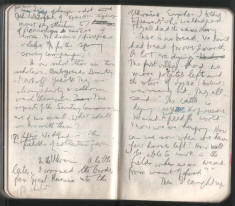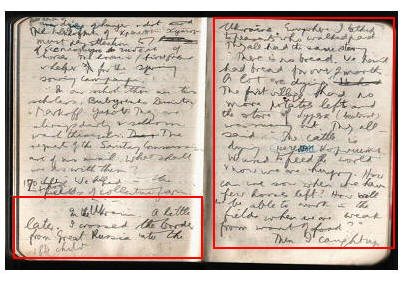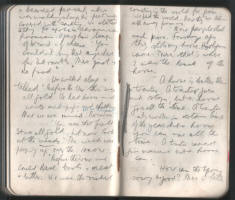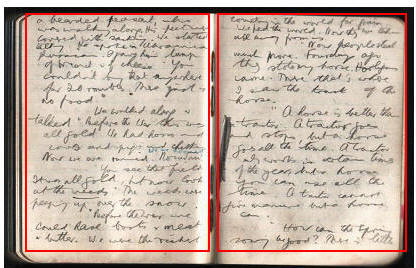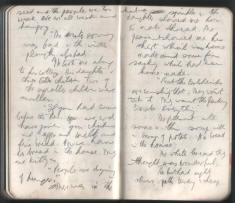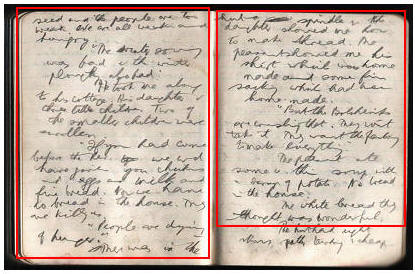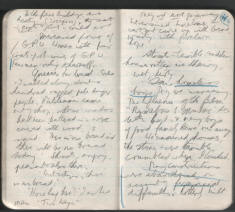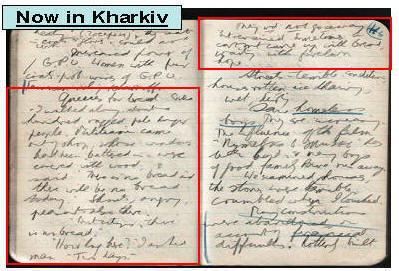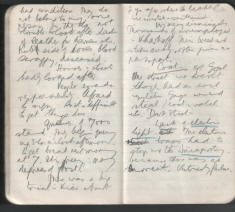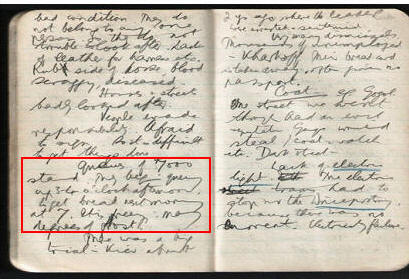Gareth Jones
[bas relief by Oleh Lesiuk]
HOME |
Stop Press |
Complete Soviet Articles & Background Information |
Précis of Gareth's
|
All Published Articles |
BOOKS
|
|
|
|
More Than Grain of Truth(2005) |
|
|
TOPICAL
'Are you Listening NYT?' U.N. Speech - Nov 2009 |
Gareth Recognised at Cambridge - Nov 2009 |
Reporter and the Genocide - Rome, March 2009 |
Order of Freedom Award -Nov 2008 |
Premiere of 'The Living' Documentary Kyiv - Nov 2008 |
Gareth Jones 'Famine' Diaries - Chicago 2008 |
Aberystwyth Memorial Plaque 2006 |
GENERAL
Scholarship Fund |
Site Map |
Links |
Legal Notices |
Sponsored Links |
Contact |
Cambridge 2009
Links to High Resolution Diary Images
Thumbnail Images below are to Print Resolution Photos of Gareth's Unique Journalist Diary Notes of his Personal Observations (during his off-limits trek of Famine Conditions in Ukraine in March 1933. These diaries represent probably the only independent Western verification of arguably Stalin's greatest atrocity/CLICK HERE to view a copy of 'The Gareth Jones Diaries' Microsoft PowerPoint presentation (5Mb) with an overview of Gareth's remarkable life and as an aide to putting the below slides in context. Or CLICK HERE to view an online version, but viewable only with MS Internet Explorer.
|
Thumbnail Links below are to High Resolution Original Images of Corresponding Diary Page (without highlighting), which can then be saved to disk. |
Below images are for informational purposes & show red highlighted passages, which are transcribed to their right. Slide numbers correspond to the MS PowerPoint Presentation; 'The Gareth Jones Diaries' -See Links Above. |
Transcriptions of Salient Passages Highlighted in Red |
|
Slides 47 & 48 |
"In the Ukraine. A little later. I crossed the border
from Great Russia into the Ukraine.
Everywhere I talked to peasants who walked past – they all had
the same story; They all said ‘the cattle is dying. (Nothing to feed.) НЕЧЕВО КОРМитьn. We used to feed the world now we are hungry. How can we sow when we have few horses left? How will we be able to work in the fields when we are weak from want of food? Then I caught up… |
|
|
Slides 49 & 50 |
…[with] a bearded peasant who was walking along . His
feet were covered with sacking. We started talking. He spoke in
Ukrainian Russian. I gave him
[a] lump of bread and of cheese. |
|
|
Slides 51 & 52 |
…seed and the people are too weak. We are all weak and hungry. “The winter sowing was bad, and the winter ploughing [was] also bad.” He took me along to his cottage. His daughter and three little children. Two of the smaller children were swollen. “If you had come before the Revolution we would have given you chicken and eggs and milk and fine bread. Now we have no bread in the house. They are killing us.” “People are dying of hunger.” There was in the hut, a spindle and the daughter showed me how to make thread. The peasant showed me his shirt, which was home-made and some fine sacking which had been home-made. “But the Bolsheviks are crushing that. They won’t take it. They want the factory to make everything.” The peasant then ate some very thin soup with a scrap of potato. No bread in house. The white bread [of Gareth’s] they thought was wonderful. |
|
|
Slide 56 |
Queues for bread. Erika [from the German Consulate] and I walked along about a hundred ragged pale people. Militiaman came out of shop whose windows had been battered in and were covered with wood and said: “There is no bread” and “there will be no bread today.” Shouts from angry peasants also there. “But citizens, there is no bread.” “How long here?” I asked a man. “Two days.” They would not go away but remained. Sometimes cart came with bread; waiting with forlorn hope. |
|
|
Slide 59 |
Queues of 7000 stand. They begin queuing up at 3-4 o’clock in afternoon to get bread next morning at 7. It is freezing. – many degrees of frost. |
CLICK HERE to return to main Cambridge Press Page




